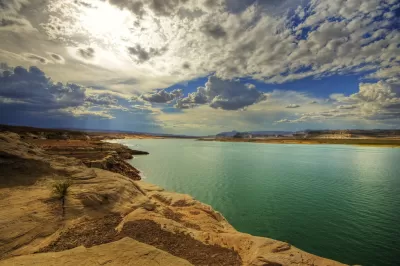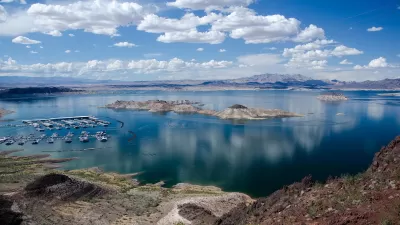Eric Balken makes the case that Lake Powell, anchored in place by the Glen Canyon Dam, is too inefficient a reservoir during times of water scarcity. Lake Mead, he says, is more than up to the task.

Water scarcity in the Colorado River Basin has prompted questions about Lake Powell, which loses up to 390,000 acre-feet of water yearly to seepage. "Nearly everyone agrees that conservation is needed basin-wide, but storing water in Lake Powell, the most wasteful reservoir in the system, isn't about saving water. Upper Basin officials fear that if Lake Powell shrinks too much, the reduced hydropower generation will drastically hike electric rates."
Glen Canyon Dam, completed in 1966, stops up the Colorado River and is the only reason Lake Powell exists. It is a key source of hydroelectric power, but it also enraged a generation of environmentalists by inundating an entire riverine ecosystem.
Balken advocates letting the waters of Lake Powell through the dam to collect in a single reservoir, Lake Mead. "This would mean Glen Canyon would transition from a reservoir destination to a world-class rafting and hiking destination. With low reservoir levels over the past decade, hundreds of miles of river and side canyons have already begun to be restored to their natural beauty." On the flip side, gas-fired plants may have to compensate for the dam's reduced generating capacity.
FULL STORY: It’s time to let Lake Powell go

Maui's Vacation Rental Debate Turns Ugly
Verbal attacks, misinformation campaigns and fistfights plague a high-stakes debate to convert thousands of vacation rentals into long-term housing.

Planetizen Federal Action Tracker
A weekly monitor of how Trump’s orders and actions are impacting planners and planning in America.

In Urban Planning, AI Prompting Could be the New Design Thinking
Creativity has long been key to great urban design. What if we see AI as our new creative partner?

King County Supportive Housing Program Offers Hope for Unhoused Residents
The county is taking a ‘Housing First’ approach that prioritizes getting people into housing, then offering wraparound supportive services.

Researchers Use AI to Get Clearer Picture of US Housing
Analysts are using artificial intelligence to supercharge their research by allowing them to comb through data faster. Though these AI tools can be error prone, they save time and housing researchers are optimistic about the future.

Making Shared Micromobility More Inclusive
Cities and shared mobility system operators can do more to include people with disabilities in planning and operations, per a new report.
Urban Design for Planners 1: Software Tools
This six-course series explores essential urban design concepts using open source software and equips planners with the tools they need to participate fully in the urban design process.
Planning for Universal Design
Learn the tools for implementing Universal Design in planning regulations.
planning NEXT
Appalachian Highlands Housing Partners
Mpact (founded as Rail~Volution)
City of Camden Redevelopment Agency
City of Astoria
City of Portland
City of Laramie





























